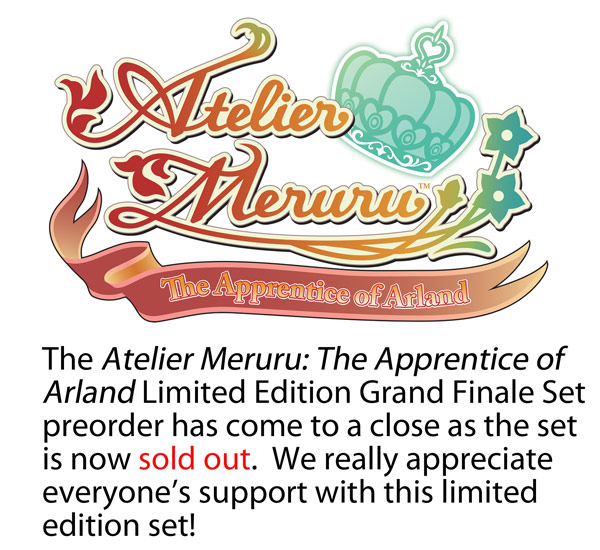(note that this is specifically about the Arland Trilogy -- the three games on PS3 so far -- or rather the first two games in it really, since Meruru isn't out yet. The whole Atelier series is too big to even describe very roughly in one post, and I haven't played all games in it)What would be the selling points of the series? What are some of the weaknesses? Is the plot a saccharine sweet story of friendship and doing your best, or is there some depth to the world and characters?
Selling points/unique features include:
- First of all, the complex alchemy system. While item creation is featured in some JRPGs (or RPGs in general), the primary gameplay system is still usually the battle system. This is not the case in Atelier. You spend at least as much time gathering ingredients and creating items with specific properties as you do in battle.
- The time-based gameplay. As you can see just above, this is a positive feature for some and a negative for others. What it means, roughly, is that most actions take in-game time, of which there is a limited (but usually ample) amount until the next large goal. Actions that take time include travelling on the world map, gathering ingredients, entering field maps, fighting monsters and performing alchemy. Lots of events are also timed, e.g. something might happen roughly a week or month after a previous event.
- Nonlinearity and multiple endings. In the Atelier games, you can almost completely freely choose how to spend your time. Which places to visit, which sidequests to participate in and how to achieve your goals (e.g. through alchemy, exploration, battle, questing, or a mixture of those). This freedom of choice leads to the games having lots of different endings depending on how you played it -- for example, if you made a lot of money and created high quality food / drink items Totori may open a restaurant after the game, or she may continue adventuring with a specific character if you reached a high adventurer and friendship level.
- There's a lot of (mostly character-based) humor, including both party members and some of the shopkeepers / supporting NPCs. While it will depend on the person how much they enjoy this, I really can't see how it could be a negative.
- The games have some of the best image quality on PS3, running at 720p with 4xMSAA and very smooth frame rates. (This is something many probably won't care about or notice much, but I do. This is also very different from the vast majority of non-Gust JRPGs on PS3, which are often a mess in this regard)
Neutral / depends on taste:
- The story in the games is generally upbeat, and at least some of the characters usually feature stereotypical anime traits (for example, the token "tsundere" female). However, at least in the Arland trilogy the overall story arc is usually rather serious, e.g. in Totori the main character is looking for her mother, whom everyone presumes to be dead. (normal ending spoiler)
There is a tearful scene when she finally discovers her gravestone, and then brings the news to her father and sister
Of course, she actually survived and shows up in one of the most satisfying true ending scenes ever.
Negative:
- The battle system being secondary is a good thing, since it's pretty standard turn based fare, with few things -- except the use of items created by alchemy -- to distinguish itself. However, it has been improving steadily from Rorona to Totori and Meruru.


